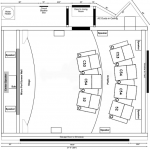Sometimes by solving one problem you create another.
This came to mind recently when I performed on a cruise line featuring something called “freestyle cruising”. Long gone are the bad old days when passengers had two choices: dinner followed by a show or a show followed by dinner. Today, passengers make reservations to eat whenever they like – and at an increasing variety of onboard restaurants. In addition to dinner reservations, passengers have a long list of other by-appointment activities to participate in such as rock climbing or ice skating. This means more options for passengers and more onboard revenue for the cruise line. But here’s the rub: as onboard options proliferate, some passengers now complain about a lack of opportunity to take in each night’s headline entertainment.
One cruise line’s solution was to adopt what they call their “3/35” format: instead of the industry standard of two nightly, 45-50 minute performances, passengers now have three seatings to choose from, with each show lasting only 35 minutes.
Having protected itself from passenger complaints about lack of opportunity to get good seats at the shows, the cruise line now receives a new complaint: the extraordinarily low-key atmosphere that prevails these sparsely-attended, third-seating performances. This problem would be less acute in a small venue, but with showrooms at sea increasingly the size of small countries, one of the three shows invariably feels more like a dress rehearsal: an ideal atmosphere for teenagers in the audience to make out in semi-privacy but hardly the high energy environment one strives for in a live show. The message sent is less “It’s showtime!” than “Here’s your third-seating performance now leave us alone, you ding bats.”
Having come the long way around the barn, here are eight simple practices to avoid the “dead room” effect.
1: Provide incentives for people to sit near the stage. In the example above, the cruise line could place on each front-row seat a free bingo card or raffle ticket or one of the trinkets (coffee mugs, key chains) for which passengers have shown themselves willing to knock over old ladies and infants.
2: Close off the balcony. But what if someone insists on watching from the balcony? Then make something up. Tell them the balcony seats have just been shampooed. That it’s just been fumigated and poisonous for a while. Or better yet, be straightforward and tell them the truth: that it’s your policy to close the balcony so long as there are seats available below.
3: Arrange for ushers to politely encourage people to sit near the front and you’ll find that others will soon follow suit without any prompting. Remember that people are far more inclined to sit near the front if they aren’t the first to do so.
4: Tape-off the back rows or, better yet, splurge for some seat covers (“Reserved”!) to funnel people toward the sweet spot: front and center.
5: Play some pre-show music already! It can be high-energy like The Beatles’ cover of “Twist and Shout!” or classic ballads like Ella Fitzgerald’s version of “Bewitched”. The main that is that it isn’t intrusive and adds to the atmosphere and anticipation. Burning 45-minutes of music onto a disc and playing it on a loop costs pennies and goes a long way to creating the atmosphere you want. What are you waiting for?
6: Three words: balloons, beach balls. I’ve performed for audiences which got so much pre-show enjoyment from watching someone send corkscrew-shaped balloons rocketing toward the ceiling or by batting around a beach ball that I got the impression they would have been content to do so the rest of the evening. If anything, the commencement of the show proper can actually be a letdown (not advised if where beverages are available).
7: For the love of God, have the courtesy to give an on-stage introduction. Asking an entertainer “Would you like an on-stage introduction?” is another way of saying “Are you going to insist I put on some pants?” Don’t fax it in, do your job. If you know a great, short joke that you can tell forwards and backwards, by all means, tell it. If you can engage the audience in anyway, by all means do so. Anything you can do to remind the audience that they are part of the show rather than idle observers is a step in the right direction.
These are just some of the ways to create some energy in an otherwise dead room. If you have thoughts on the subject, leave a comment below.
Return to daviDDeeble.com or see how a head injury forced me to reinvent myself.




